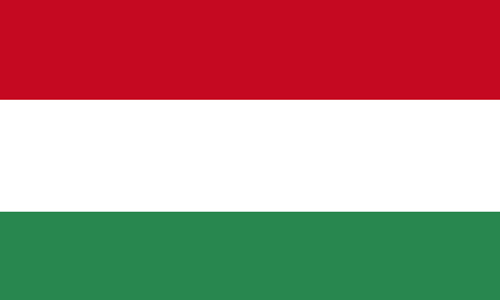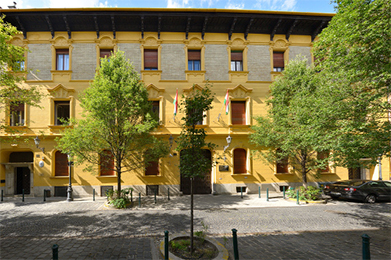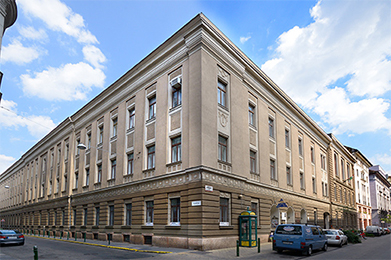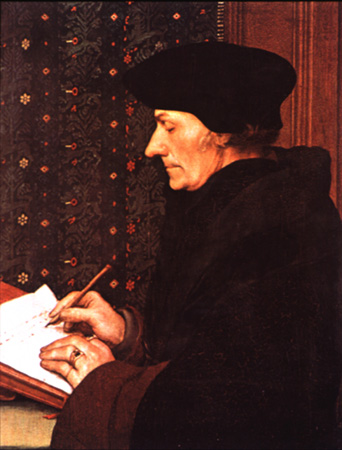Programme
„Empires, Nationes, Churches”
8-19th March, 2010
in Budapest
Teories about the Origen of Hungarian Lenguague and it’s Role in the Sociaty Reformes in the 18/19th Centuries
Lecturer: dr.Prof. Honti László - professor KRE
Hungary as a part of Turkish Empire
Lecturer: dr.Pál Fodor
Institute of Historian Studies of the Academy
Hungary in the Habsburg Monarchy
1526-1918
Lecturer: Dr.Prof. András Gergely - professor KRE
Departmento of Contemporary Hungarian History
The Austrian-Hungarian Monarchy – Is it „a prison of peoples”?
Lecturer: Dr. Béla Makkai - candidate
KRE Department of Contemporary Universal History
Plans Aganst-Empire in 19th century Europe
- Confederation Danube and Union Iberica –
Lecturer: dr. Viktória Semsey
KRE Department of Contemporary Universal History
Historical Trajectory and National Identity
Lecturer: Prof.Dr. János László
Professor University of Pécs, Institute of Psychology
Departmento of Social Psychology
On the Long Journey to National Holiday: March 15, 1848
- Searching for Identity and Lobbying for Political Interest -
Lecturer: István Pelyach
KRE Department of Contemporary Hungarian History
Empires of Fiction in some Hungarian Novels
Lecturer: dr. Margit Santosné Blastik
KRE Department of Foreign Languages
Music and National Identity
Roma Musicians and What They Played int he 19th and 20th Century in Hungary
Lecturer: Lázár Balogh
Conductor of Orchestra, Organist
Trianon 1920 and 1956 through Hungarian National Identity
Lecturer: Dr. Zalán Bognár
KRE Department of Contemporary Hungarian History
History of Hungary int he 20th Century through Political Jokes (a social psychological approach)
Lecturer: Judit Ujlaky
Department of Developmental and
Educational Psychology, KRE
The Role of the Hungarian Reformed Church in Cultural Preservation, in the Past and Today
Lecturer: dr. Kelemenné Márta Farkas
KRE Head of the Department of Foreign Languages
The Churches in Hungary after the Polictical Changes of 1989
Lecturer: Dr.István Szabó
Bishop, Danube Diocese of the Reformed Church
Continuing Trends and Challenges In Mission and Missiology:
Leadership Issues in Central and Eastern Europe
Lecturer: dr. Anne-Marie Kool
Head of Central and Eastern European Institute for Mission Studies of Univ. KGRE
Budapest
Portuguese Fado: an introduction
The Portuguese Discoveries
Lecturer: dr.Carlos Mauricio - Docente
Institute of History of University ISCTE, Lisbon
Portugal
The Modern Portuguese Empire: Building a colonial system in África 1822-1961
The Fall of the Empire 1961-1974
Lecturer: dra. Ana Mouta Faria - Docente
Institute of History of University ISCTE, Lisbon
Portugal
The Role of the Chatolic Church in the Building of Spanish Colonial System 16-18th Century
Cultural market and cultural policy in 19th Century Spain
Lecturer: dr. Raquel Sánchez García
Universidad Complutense
Departamento de Historia Contemporánea
Spain
From Empire to Nation-State: Spain and the World int he 20th Century,
Transnational population movements in Contemporary Spain
Lecturer: Dr. Carlos Sanz Díaz
Universidad Complutense
Department of Contemporary History
Spain
Fotoexposición:
„Three Disappeared Empires in the Now-Day Hungary”
By Diego García Martínez, actually Erasmus-student in Budapest, KRE
from the University Complutense, Madrid




 The Erasmus Programme
The Erasmus Programme Title of the programme:
Title of the programme: 